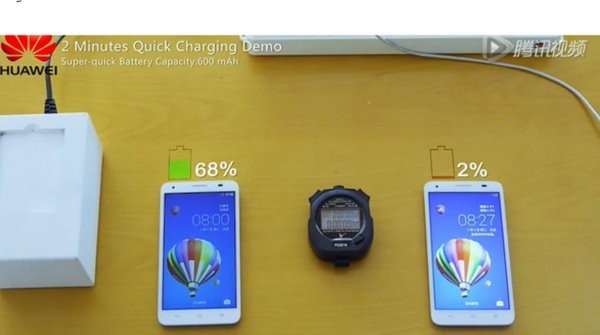Huawei has developed a new quick-charge lithium-ion battery that can juice up smartphone and tablet power supplies 10 times faster than current ones. A demo video shows that the new tech and a charger can power up the phablet-size 3,000 milliampere hour (mAh) batteries from almost empty to almost 50 percent capacity in only five minutes, and in theory could charge an iPhone 6s battery in less than seven minutes.
Smartphone makers continue to design thinner and lighter models. One main drawback is that the devices have a much shorter battery life.
A fast-charging battery would provide mobile phone owners more options. Today's main choices now are to charge smartphones twice daily or use a big-screen phablet that is difficult to hold and carry.
The new Huawei battery could be a game-charger when it is available for the retail market. It was developed at the company's Watt Lab and introduced at the Battery Symposium in Japan, according to Tech Times. It is substantially faster than current lithium-ion batteries.
In another demo video, a researcher charges a smaller 600 mAh battery to about two-thirds capacity, in only two minutes. Both battery sizes are recharged in a new type of charging cradle.
The battery works by bonding heteroatoms (ring-shaped non-carbon/hydrogen atoms) to graphite molecules in an anode (negative electrode). This method could collect and transmit lithium by using carbon bonds, according to BGR.
Huawei reported in a press release that the heteroatoms boost batteries' charging speed. However, they do not decrease the battery life.
The Chinese tech company believes its battery breakthrough will be a game-changer among electronic devices. That includes mobile phones, wearable devices, and electric cars, allowing people to charge batteries in the time required to drink a cup of coffee at Starbucks or Dunkin' Donuts. It is also much faster than quick-charge batteries from Samsung and Qualcomm.
Huawei has not announced when the new tech will be available in consumer products.



























